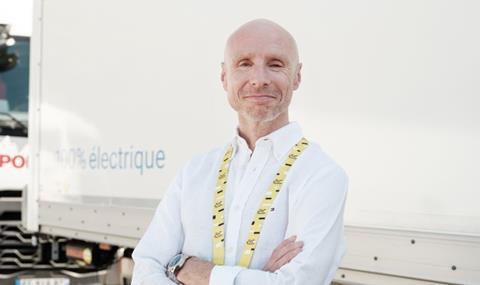
UK MD Dan Myers expands on the company’s 42-year partnership with the Tour de France and his determination to navigate the challenging road ahead
The July morning is already scorchingly hot as I wait on the Champs-Élysées to meet XPO UK MD Dan Myers (pictured).
We're here in Paris for the last day of the 2022 Tour de France, which has already seen the logistics giant transport more than 570 tonnes of goods across nearly 3,500km using 42 trucks and 58 drivers.
Amid a buzz of activity and palpable excitement, I watch the crews drag barriers and associated paraphernalia from cavernous trailers as preparations for the final stage of the world's biggest cycling event continue.
It’s one hell of a logistical challenge, especially in this heat, but amid all the hubbub there’s a sense that everybody knows exactly what they’re doing. After all, XPO’s partnership with the tour now stretches back 42 years and the whole operation is clearly well rehearsed.
Myers isn’t quite what I’m expecting as he bounds up to meet us. His publicity photo gives him the look of a besuited Oxbridge academic, probably very on-message. Instead, he’s dressed casually in shorts and is disarmingly engaging as he begins explaining more about the partnership in a broad Wigan accent.
“When you see the crews and the drivers putting these things together it’s like a military operation,” he says. “It’s something to behold, it really is. Literally as the last rider crosses the finishing line the crews and drivers are out there. It’s so well organised. Within an hour the entire set-up has been dismantled and making its w
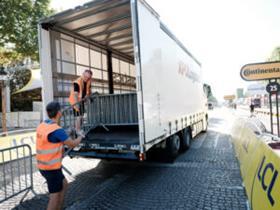
ay to the next stage.”
Tall and angular, it’s no surprise to find Myers is also a keen cyclist and is clearly looking forward to the culmination of the Tour later in the day. But he’s also keeping a close, if very relaxed, eye on preparations.
“If you get this wrong it’s very high profile,” he laughs. “You’re trying to keep the riders safe and the pedestrians safe. There’s a lot of plate spinning.”
Just to complicate matters, the Tour’s organisers introduced a stage in the Copenhagen this year, and Spain is earmarked for 2023. But the drivers are all experienced XPO staff, hand-picked for the job. Some have been doing it for over 20 years. The challenge, Myers says, is to introduce new drivers every year while retaining the family ethos.
Choosing a winner
As you’d expect, there’s also an increasing need to decarbonise the fleet. Nearly 50% of the trucks are now running on HVO, the rest on Euro-6 diesel.
He agrees that for the moment there are a confusing mix of options and no silver bullet, which “makes things incredibly difficult”.
“The government says it won’t choose a winner but what were those incentives for buying electric cars? They’ve chosen a winner by incentivising people to switch to an electric vehicle," he says. "That’s easy for LGVs. But when you get the bigger vehicles, the size of battery, the weight and the range become more problematic.”
It’s one of the themes XPO
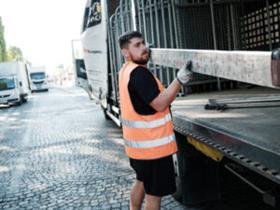
will no doubt debate with Stobart, Tesco and other major players who formed an action group in July to accelerate the race to Net Zero for HGVs.
“There’s not the time for the vehicle to be sat for long periods to charge so is electric the right answer?” Myers continues. “Then you have the alternative of hydrogen. I’m a big believer in it; it’s got a part to play and it’s a super fuel. Green hydrogen comes from the right sources. But what firms need is more direction. We’ll take an educated leap and that’s what we’ve done with HVO. But smaller operators don’t have the same scale, it’s more of a risk.
“It’s like a battle front, you’re spreading your resources very thinly and only moving forward very slowly. Whereas if you’re much more focused and put all your resources into one area you can move forward much more quickly.”
Challenges
The chat breaks off as we duck into the shade of a truck to escape the blazing sunshine. At this point I’m introduced to Daniel, one of XPO's most seasoned Tour drivers. Luckily there’s a translator on hand who he tells me the previous stage was 500km away and they made it here to Paris at 6am, leaving at 8pm the night before.
“We’ll sleep after the set up,” he says with a typical Gallic shrug. “We always finish at lunch time, go for a break and a shower, then at 6pm when the last cyclist passes the line they start dismantling. Then we go to the next stage overnight.”
So aside from time pressures, what are the other big challenges?
“It’s very tricky sometimes because there are very narrow places,” Daniel says. “Sometimes I have to drive on the edge. You have to go in places you’re not supposed to go. People on the sides of the road clap and shout to us because it’s so difficult to drive up there. It’s like, ‘XPO, XPO!’

“We can only drive for nine hours so there are more drivers than trucks,” he continues. “It’s a rule we have to follow.
“Another big challenge is having to get used to every country’s regulations and to prepare. But the biggest headaches are left with the co-ordination team.
“We have back-up drivers but the teamwork is most important. The team have known each other for years. They don’t see each other during the year but then meet up again for the Tour.”
Later we break for lunch where Myers’ focus switches to the UK business. For the last five years XPO has been growing at over 10%, he says, primarily driven by diversification into grocery, technology and last-mile home delivery.
In the last three months it has signed new distribution contracts with the likes of Cromwell Tools, Anglian Windows, Luxury Flooring and hydrogen retailer Element 2. It has also extended an existing deal with building materials manufacturer Etex.
However, Myers admits the war in Ukraine and growing economic pressures back home, including fuel price increases, have triggered “more nervousness and less optimism” in the wider industry.
“We will make the best of whatever the outcome is,” he insists. “Every change is an opportunity. It may mean that some businesses don’t survive. Change is as fast as it’s ever been so you need to be as adaptable.
“The problem with fuel is not necessarily the price. Pretty much all the industry works on a recovery mechanism. It’s more about what it does to the wider economy. It’s sucking people’s spend. That’s a bigger impact.”
Myers’ best customers are the ones who challenge him, he says. The ones that
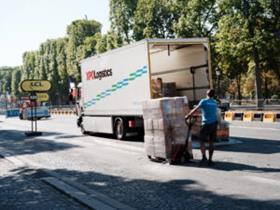
recognise XPO is an extension of their business and encourage it to be better.
“We want a challenging, trusting, open partnership with a bit of give and take, so if you want a favour you get it back in spades,” he says.
“It’s our job to save all those customers from our competitors. Our mission is to save them from making a bad mistake. I would never speak badly of our competitors, but there are things that set us apart. The way we treat our customers. We respect who pays our salary.
“Some are more specialist but we’ll take the best of what they offer and the best of what we offer and together we’re stronger.
“This team is one of the best in the industry,” he adds. “We are super laser focused on results and move heaven and earth. If we’ve made a promise to a client it’s almost do or die.”
Culina
So what does he make of Culina’s aggressive growth plan? And in particular its head-turning acquisition of Stobart?
“Culina have acquired a lot of businesses,” he says. “But I’m not sure how they come together and integrate?
“Stobart have got things that make them strong - their full truckload network. Not many people have the same level of service offering. It’s a genuine point of differentiation. Then there’s iforce which is part of Stobart, and TPN, but you struggle to see how that comes together as one.
“What’s not clear with Culina is what the plan is. It was clearer before Stobart. They seemed concentrated on chilled and ambient. You can create synergies with that.”
However, Myers agrees that the trend for increasing consolidation in the wider industry favours XPO, ensuring it doesn’t become too big too quickly. “The challenge is having enough people to support that growth,” he says. “That’s where you can come unstuck.”
Since joining XPO way back in 1988, Myers has earned the reputation for being something of a turnaround specialist. Eight years ago, for example - while still working for Norbert Dentressangle before the XPO acquisition - he was asked to rescue a side to the business that was “in a really bad place”.
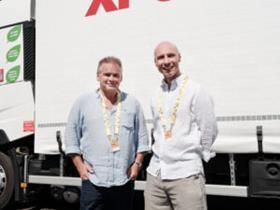
“I’m good at fixing things,” he says. “When I was with the old Christian Salvesen side I was always given the problem accounts. At 31 I became a business unit director in Salvesen. We built the world’s biggest pea processing facility. If you’re going do something, do it big. We would re-prioritise, get them in a steady state and move on to something else.
“So I came in and we were hemorrhaging money. The team had been battered. Some had lost their heads. It was a tough environment. You have to choose the changes you make, choose the battles. You have to convince people it will be a positive experience. So I made simple changes in trunking to increase our efficiency and reduce our empty miles and timings and the way the trucks ran, and it worked.”
He’s also a great believer in understanding his clients’ businesses: “I worked with Bird’s Eye so the things I know about peas and runner beans is unbelievable,” he grins, before launching into a lengthy and passionate description of how they’re harvested.
Shifts and sub-contractors
One recent improvement to the XPO business that Myers highlights is the introduction of better shift patterns. The move has helped older drivers avoid working long, unsociable hours. Instead he’s found a pattern that suits their lifestyle – basically four on, four off rather than the “hugely unsociable” five from seven.
“It’s been really surprising how it’s drawn people to us,” Myers explains. “People say we’re losing a shift every week. I said ‘no, I’ve recruited a new driver, I’ve got four new shifts. He won’t work for you for five when his life is upside down’.”
XPO was not immune from the driver shortage, he continues, but fared better than many because of its relationships with around 450 sub-contractor partners.
The company has also addressed the current clamour for better wages by agreeing a deal with Unite which raised pay for fuel tanker drivers by an average of £12,000. The move avoided the likelihood of strike action.

“Sub-contractors are part of a healthy eco system in our line of business,” Myers continues. “So when we want a favour, when we’ve got more capacity or a gap to fill, we can turn round and say we need some support here. It’s reciprocal. And they will choose us over others who perhaps haven’t treated them the way you should treat a partner.
“We haven’t let our customer down. We were delivering 70% ourselves. But the balance now is 80% sub-contractors and 20% ourselves. During last year we were pushing about 140 shifts a week into one of our retail clients from our various sub-contractors.”
In the current climate, some sub-contractors might seem in danger of folding. But Myers takes a different view: “If the economy contracts and therefore there’s less being manufactured and consumed there will be an impact on our industry. It will mean less demand. We’d downsize some of our own operations but we want to keep our sub-contractors involved and engaged. It’s not in our interests to see them struggle.”
He also insists he is not necessarily looking to buy out smaller players: “We might push their business somewhere else if the volume isn’t there for them in order to help,” he says. “We can’t do what we do without their support and involvement, it’s a two-way street.
“Sadly not everyone looks at it that way. There’s a load of sub-contractors who won’t work with the big 3PLs because they’ve had bad experiences. But we need them.”
So with XPO seemingly in a good place right now, does he plan to accelerate the company’s growth?
“The reason we’re growing is that it’s at a sustainable rate and we can convince customers we’re the right partner,” Myers concludes.
“In five years we’ll pretty much double the size of the business. In another three years there’s no reason we can’t do a billion turnover which would put us not far behind Wincanton.
“There’s loads of potential and we have lots of good people. As long as that’s there I’ll be motivated to continue leading this business and saving those customers.”













